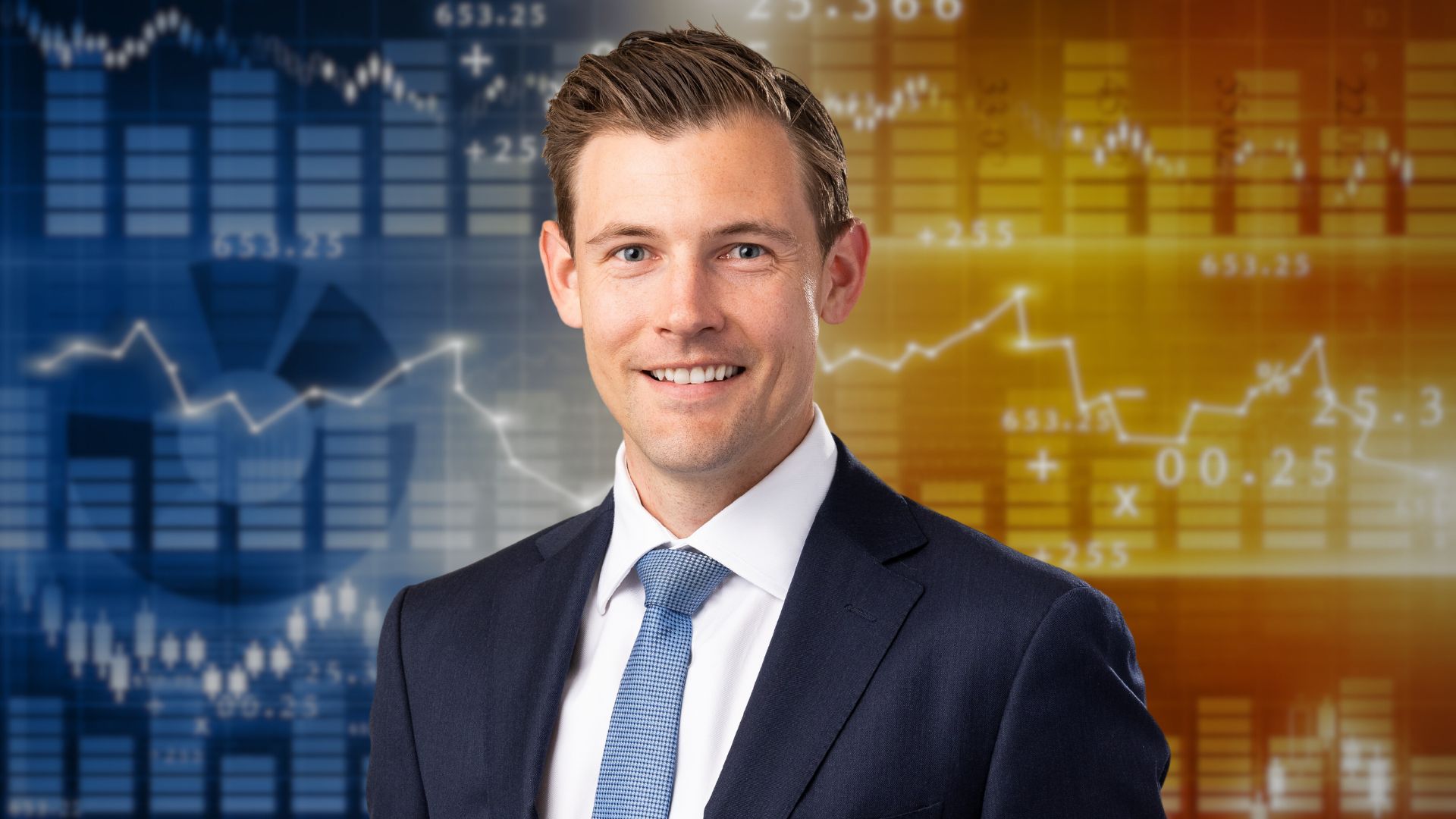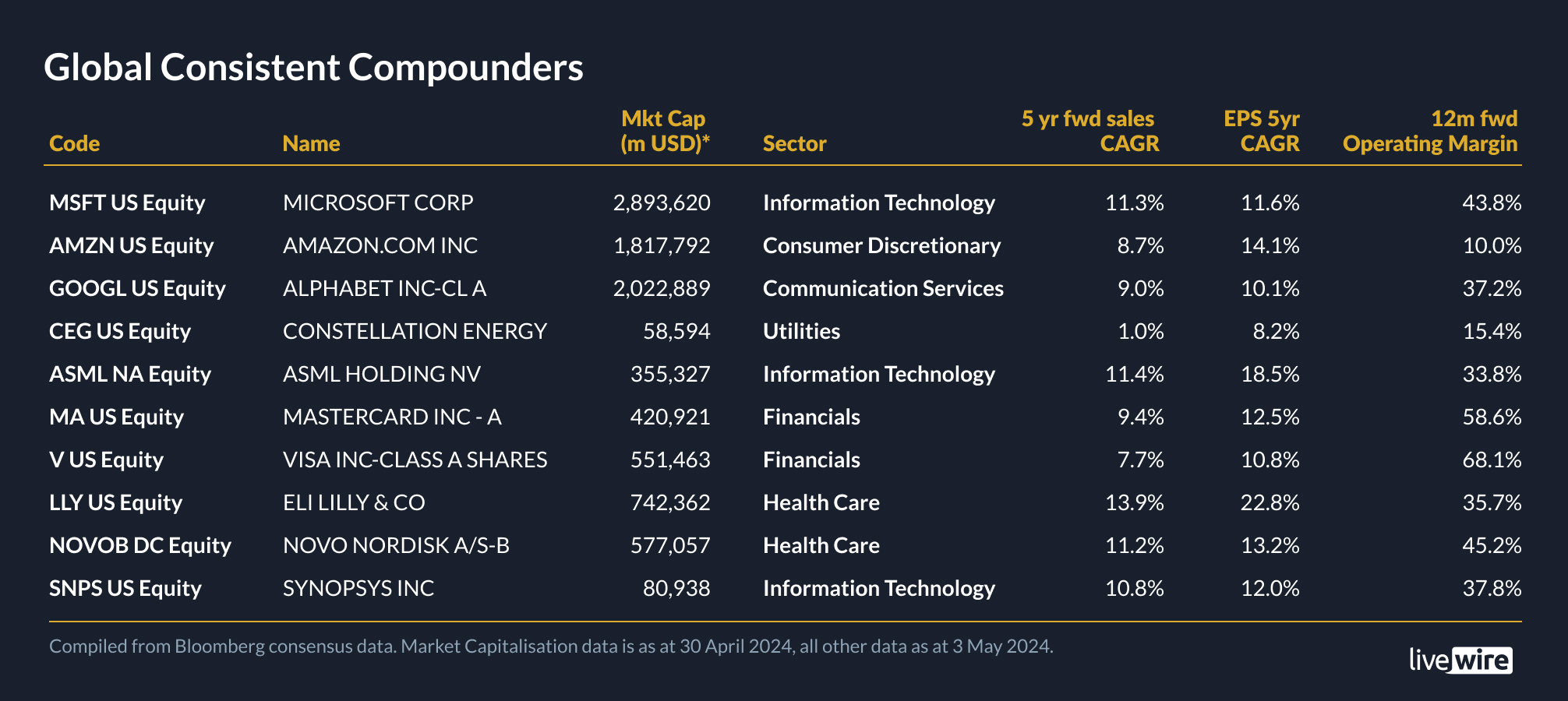How to find the world's most consistent compounders (and 10 that make the cut)
There's something to be said about stocks that you can safely store in your back pocket - companies that can consistently grow their earnings over the long term, and hopefully, deliver reliable share price performance at the same time.
On the back of the success of a recent piece on some of these consistent compounders down under, I thought it may be worthwhile to explore the same idea on the global stage. After all - and this may be a hard pill for some to swallow - the majority of the world's best businesses are not based in Australia.
The market cap of the Australian share market is only $1.6 trillion. The US market, in comparison, is worth a whopping $52.6 trillion. This dwarfs the second biggest equity market in the world, China, which has a market cap of $11.5 trillion, according to data from S&P Dow Jones Indices.
When it comes to the world's most consistent compounders, a long runway of earnings growth, backed by a multi-year or decade structural change, is incredibly important. Earnings durability, backed by an impressive total addressable market, should also take centre stage.
That's according to Munro Partners' Kieran Moore, who says there is a small subset of stocks in the global universe that would fit into that "consistent compounder" category.
In this wire, Moore outlines what it takes for a globally-listed company to be considered a "consistent compounder", shares some of the quantitative and qualitative factors that are important when it comes to picking these stocks, and names a few companies that he believes make the cut.

LW: Distilled really simply, what is a consistent compounder?
Kieran Moore: At Munro, we're looking for great growth businesses. So a consistent compounder is a growth business with a long runway to grow its earnings. Those earnings are typically backed by global structural change, whether that's retail shifting online, payments becoming digital, the planet moving towards decarbonisation, or semiconductors becoming more high-end to enable AI. For us, a consistent compounder would have the backing of a global structural megatrend, and therefore, have a long runway to grow it to earnings, revenues or cash flows over a multi-year period.
How do you actually measure that growth runway though?
One of the things we look for in all the businesses that we invest in is what's called earnings durability. What we're really thinking about is how big a company's total addressable market is. For example, retail sales shifting online or e-commerce becoming more prevalent globally. The total addressable market is realistically how much of the total retail sales around the world could be online in the future.
Investors should ask themselves, 'What is the big picture opportunity?' and then, 'How much share could this company take within that opportunity?' We want to make sure that they are the key enabler or one of the key enablers of that big structural change and therefore can grow their earnings in a sustainable way over the long term.
Can we get a little bit more granular? What metrics are important for consistent compounders?
We want companies' top-line revenue figures to grow at a rate that is at least double GDP, or at least outgrowing their market or industry. If they're growing their sales faster than their market, then they effectively have some degree of competitive advantage or pricing power.
We also like companies that are growing their earnings - so EPS, EBITDA or operating profits - faster than their revenues. This means a company is expanding its margins over time and becoming more profitable.
Management is also really important for growth compounders. We always look for companies with a controlling shareholder or a founder still involved in the business. Founders think much more long-term about the opportunity set in front of them. If you think about some of the world's most famous founders over the last 10 to 30 years, people like Steve Jobs or Jeff Bezos - these founders thought about where their business would be in 20 years' time.
In comparison, the investment community might be focused on the next quarter, the next six months or the next 12 months. So a controlling shareholder aligned with the shareholder base can create durable growth and margin expansion over a long period of time.
The last thing that we always like to look for, and it's a little bit hard to judge as it's more subjective, is really great customer perception of the product. For example, when customers really love a product it can grow virally, meaning that the company never really has to “sell” the product.. To gauge this, we look at download data, customer reviews, trending data and we also watch a lot of YouTube videos about products to understand what the customers actually like about the company.
Which types of companies wouldn't fit in that consistent compounder category?
We are looking for companies that enable structural changes to play out. So, MasterCard (NYSE: MA), for example, enables the shift from physical to digital cash. It's a really obvious structural change in the world that we all know and understand, but it has created a great compounding company over many years.
Let's compare that company to banks, for example. A bank's earnings aren't driven by that structural change from physical to digital cash. Yes, they benefit from that structural change, but a bank's earnings are more impacted by external macro factors like central bank moves, inflation, and unemployment. That makes it difficult to get that compounding nature of earnings over a long period of time.
So, where a company is more vulnerable to the macro, and where it's not backed by one of these big structural changes in the world, is where you are unlikely to see that great compounding element over the long term.
Resources companies, cyclicals and some parts of the energy market are also more macro-exposed, so they typically wouldn’t fit into how we think about a consistent compounder.
How many consistent compounders are there in the global universe?
Clearly, we don't view the roughly 25,000 companies in the global listed market, with a market cap over $100 million, as compounders. We've got a small subset that we think benefits from these structural changes and has the growth, leverage, strong customer perception, and expanding margins, with a management team that is strongly aligned with shareholders that we are looking for.
There is a universe of about 1000 stocks that we think exhibit those characteristics to varying degrees, and they're spread across various areas of structural growth, such as e-commerce, digital payments, climate change, innovative healthcare, and big data.
1000 stocks would probably be too much to cover in this wire, but could you take us through a few examples?
I think an obvious one is Amazon (NASDAQ: AMZN). So, if you think about the two markets that Amazon exists in and think about the total addressable market opportunity, retail sales are still roughly 70-80% offline. E-commerce is only about 25% of total retail sales. And in our view that is going to lift higher over time. So that provides the structural underpinning for Amazon's e-commerce business.
The second business that it operates in is cloud computing. As the company tells us, roughly 85% of workloads are still done outside of the cloud. Amazon believes that is also going to shift. So this is a second big structural tailwind for Amazon's AWS business to grow for a long period of time.
Another example is decarbonisation. We believe the world needs to decarbonise over the next 10-30 years. It's going to take a long time and a lot of effort. But we think the cost of not decarbonising is far greater for the planet. Clearly, renewable companies will benefit from that, but we also think companies that operate in the nuclear energy space can too.
We've invested in a company called Constellation Energy (NASDAQ: CEG), which is an operator of nuclear assets in the US. Nuclear is one of the lowest greenhouse gas-emitting forms of energy. It's going to play a really important role in the transition towards decarbonisation. Constellation Energy is the largest provider of those nuclear assets in the US and we believe it can grow its earnings in a material way over a long period of time.
Another business we like is TSMC (NASDAQ: TSM), which is a semiconductor manufacturing company. It is a business that builds semiconductors for companies such as NVIDIA (NASDAQ: NVDA) and AMD (NASDAQ: AMD) that are used in AI applications that consumers and businesses will use in the years to come. TSMC has that structural underpinning to grow its earnings in a consistent manner and it has a big total addressable market.
In digital payments, MasterCard (NYSE: MA) and Visa (NASDAQ: V) are classic examples of compounders. Everyone is familiar with these businesses, but digital payments today still only make up roughly 70% of total payments in the world. There are many emerging markets that are yet to digitise their payment systems.
In innovative healthcare, we've been invested for several years in the GLP-1 opportunity. This both improves outcomes for the patient and removes costs from healthcare systems. GLP-1s address the obesity problem, which on a global basis affects approximately 1 billion people, of which only a small percentage are treated with pharmaceutical drugs. The companies that provide these drugs, like Novo Nordisk (CPH: NOVO-B) and Eli Lilly And Co (NYSE: LLY), are set to grow their earnings as a result of this large opportunity over a long period of time. That growth is durable because it's a big addressable market with little penetration today.
.jpg)
Source: Compiled from Bloomberg consensus data. Market Capitalisation data is as of 30 April 2024. All other data is as of 3 May 2024.
Is there one stock in particular that you are particularly bullish about right now?
We believe TSMC provides a good opportunity right now given the multiple ’we have to pay today. TSMC has a broad end-market exposure across areas such as high-end semiconductors, autos, industrials and consumers.
TSMC is not growing its earnings as fast as other semiconductor companies such as NVIDIA, but we believe the valuation is attractive. It’s priced at just above the S&P 500 multiple on a 12-month forward basis, and it’s the leader in an oligopoly with competitors Intel and Samsung. So the valuation, in addition to that competitive positioning in a market that is accelerating, means it could have the potential to be a compounder over the long term.
Last question - are these stocks that investors should trade or are they "buy and hold" stocks?
As investors, we keep across earnings reports, which are important as we believe earnings growth drives share prices. Anytime a company updates its earnings profile, that can be an important catalyst for an investment case to play out. However, over the long term, in our experience, and consistent with our investment philosophy, great compounding businesses are held and not traded.
For example, Amazon has been able to grow its Prime Membership base over almost 20 years or its AWS product since 2006. During that time, we've had lots of different macro-related impacts on the market - we've had the GFC, a European crisis, the COVID pandemic, we've had different political leadership in power around the world, but over that period, you didn't really need to worry too much if you were a long-term investor.
All of these different events impacted the stock on a short-term basis. But really, to be a successful Amazon investor, you just needed to work out that retail sales would shift online in the future and that workloads would shift to the cloud as well. Those two big structural changes outweighed all the macro factors, allowing Amazon to be the great compounder it has proven to be.
4 topics
8 stocks mentioned
1 contributor mentioned

